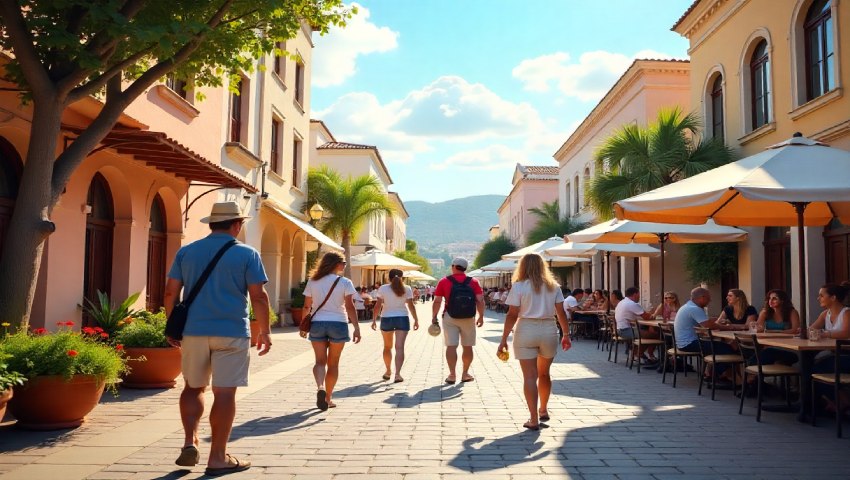Published on October 25, 2025
Thailand joins Vietnam, Indonesia, Australia, and Japan in launching bold tourism stimulus packages aimed at supercharging global recovery. These packages are designed to revive the tourism industry, drive economic growth, and promote domestic travel. With the high season rapidly approaching, Thailand’s government is focused on stimulating the local tourism and hotel industry while providing support to businesses across the nation. Approved by Thailand’s Cabinet in late October 2025, this significant stimulus package targets a substantial economic boost, making travel more accessible for both individuals and companies. As Thailand joins this global movement, it sets the stage for a major economic shift, offering exciting opportunities for travelers and businesses alike.
Key Focus of Thailand’s Tourism Stimulus
The primary goal of this stimulus is to increase domestic travel demand and help maintain economic momentum through 2025 and into 2026. The government aims to achieve a modest 0.04% increase in the country’s GDP through the tourism stimulus measures. The package focuses on incentivizing both individual travelers and businesses, with a particular emphasis on local hotel bookings, event attendance, and other tourism-related activities.
Advertisement
Advertisement
The most notable aspect of the stimulus package is the tax relief targeted towards domestic travel. Individuals and companies will receive tax deductions on travel expenses, which include hotel stays, transportation, and meals at local restaurants. This is expected to boost spending and encourage more domestic tourism, helping local businesses thrive.
Tax Relief for Domestic Travelers
The government is offering personal income tax deductions of up to 20,000 baht for individuals who travel within Thailand from 29 October to 15 December 2025. This incentive includes expenses like accommodation, meals at restaurants, and other travel-related services.
To encourage travel beyond the most visited destinations, the Thai government is also offering additional tax benefits. For trips to secondary provinces, travelers can claim a 1.5-times deduction, while travel to major destinations will be deductible at face value. By spreading the benefits of tourism more evenly across the country, the government aims to stimulate regional growth and reduce overcrowding at major tourist spots.
The expected impact of these deductions is significant, with around 140,000 claimants anticipated to spend an estimated 2.8 billion baht. This surge in domestic travel spending will flow directly into local businesses, benefiting hotels, restaurants, transportation services, and many more sectors that rely on tourism.
Incentives for Corporate Travel
In addition to individuals, businesses are also targeted by the tourism stimulus package. Companies and partnerships registered in Thailand can claim deductions on expenses incurred for seminars, training events, and other corporate activities held within the country. These eligible expenses include venue hire, accommodation, transportation, and tour services.
The corporate travel aspect of the stimulus package aims to support the hotel and conference industries by providing financial incentives for businesses to host events at local venues. This is expected to increase demand for meeting spaces, hotels, and related services across the country, particularly in less-visited regions. The package offers a 2-times deduction for events held in secondary cities, and a 1.5-times deduction for events held in major tourist destinations.
The Thai government anticipates that around 1,500 businesses will participate in the scheme, contributing approximately 315 million baht in additional spending. This boost will have a direct and immediate effect on hotel occupancy rates and local service providers, injecting vital funds into the tourism ecosystem.

Accelerating Public Sector Spending
In an effort to maximize the impact of the tourism stimulus, Thailand’s government has directed state agencies, local administrations, and state enterprises to speed up their spending plans. The aim is to ensure that at least 60% of the fiscal-2026 budgets for seminars, training events, and other tourism-related activities are disbursed between October 2025 and 31 January 2026, when demand for hotel rooms and event spaces is at its highest.
This strategy will benefit the hospitality sector, as government spending will provide a steady stream of business for hotels and meeting venues, especially during the busy holiday season. By front-loading spending, the government hopes to sustain demand for local tourism services and promote a more balanced distribution of tourism across the country.
Impact on the Hotel Industry
The tourism stimulus package is expected to significantly benefit Thailand’s hotel industry. Increased demand for hotel rooms and services will lead to higher occupancy rates and greater revenue for hotel operators, both in major tourist hubs and in less-visited regions.
As more travelers take advantage of the tax incentives, there will be a surge in bookings at hotels, restaurants, and transportation services across the country. This rise in demand is likely to spur further investment in the hotel industry, with operators looking to upgrade existing properties and open new hotels to meet the growing expectations of tourists. The government’s tax relief for hotel expenses will also make it more affordable for operators to invest in renovations, new amenities, and services to attract both domestic and international tourists.
Supporting Regional Growth
One of the key goals of Thailand’s tourism stimulus package is to promote a more balanced distribution of tourism across the country. By providing additional tax incentives for travel to secondary provinces, the government aims to support regions that typically receive fewer visitors. This approach is expected to help reduce overcrowding in popular destinations like Bangkok and Phuket, while stimulating economic growth in less-visited areas.
In the long term, this strategy will promote a more sustainable tourism model, ensuring that the benefits of tourism are shared more evenly across the country. The government’s investment in regional tourism also aligns with broader efforts to develop infrastructure and improve local economies in these areas.
Sustaining Growth Into 2026
While the immediate focus of the tourism stimulus package is to boost domestic travel during the high season of 2025, the Thai government is also working to lay the foundation for sustainable growth into 2026. With domestic travel expected to increase toward the end of the year, the government anticipates that the package will amplify demand for local tourism services, including hotels and tour operators.
By providing tax breaks, accelerating public sector spending, and investing in less-visited regions, Thailand is positioning itself to continue benefiting from the tourism sector’s growth well into 2026. The tourism stimulus package will not only provide a short-term boost to the economy but also help build a more resilient and sustainable tourism industry for the future.
Vietnam: Stimulating Growth with Comprehensive Tourism Plans
Vietnam has taken bold steps to boost its tourism industry with a comprehensive stimulus package. One of the primary goals of the initiative is to attract both international visitors and locals to explore the country’s rich cultural heritage and stunning landscapes. The Vietnamese government has targeted ambitious goals, including 10 million international visitors and 50 million domestic travelers.
Ho Chi Minh City: Partnering with Major Platforms
Ho Chi Minh City has launched a dynamic tourism development program designed to achieve these lofty goals. The city is leveraging partnerships with well-known platforms like Traveloka and Shopee Food to offer discounts and promote local cuisine. By doing so, the city is making travel more affordable and appealing for tourists. These partnerships aim to enhance the overall visitor experience, while also boosting the local food and hospitality industries.
The initiative seeks to engage a wide range of travelers, from international tourists to local visitors, and encourage them to explore not only Ho Chi Minh City but also other lesser-known regions in Vietnam. This comprehensive effort is expected to have a significant impact on the country’s economy by creating jobs, increasing tourism revenues, and stimulating local businesses that rely on visitor spending.
Da Nang: Diversifying Experiences for Visitors
Da Nang, another vibrant destination in Vietnam, has introduced the “Enjoy Da Nang 2025 – Diverse Experience” program. The initiative focuses on attracting tourists to explore the city’s numerous attractions by offering free entry to several popular sites. Da Nang is aiming to establish itself as a must-visit destination by promoting its scenic beaches, cultural landmarks, and diverse culinary offerings.
Through this initiative, the city hopes to increase the number of both international and domestic visitors. By diversifying the tourism experience and highlighting its unique offerings, Da Nang is positioning itself as a more accessible and exciting destination for travelers from all corners of the world. This effort will not only help boost local tourism but also contribute to the broader growth of Vietnam’s tourism sector.

Indonesia: Economic Stimulus to Support Tourism and Infrastructure
Indonesia, with its rich cultural heritage and diverse landscapes, has launched its own series of tourism stimulus measures. In September 2025, the Indonesian government introduced an economic stimulus package worth 16.23 trillion rupiah (approximately $989 million). This package includes food aid, tax relief for workers in the tourism sector, and a “cash for work” program aimed at creating jobs through infrastructure projects.
Financial Relief for the Tourism Sector
The tax relief measures in Indonesia’s package are particularly focused on tourism sector workers who have been affected by global disruptions in the travel industry. By alleviating the financial pressures on these workers, the government hopes to help maintain the viability of the country’s tourism sector and ensure that businesses remain sustainable in the long term. The cash for work program is expected to target over 600,000 individuals, providing both short-term employment and a boost to the economy.
Additional Measures to Stimulate Domestic Travel
In October 2025, the Indonesian government announced an additional stimulus package worth 30 trillion rupiah ($1.81 billion), featuring a wide array of measures aimed at boosting domestic tourism. The new package includes cash handouts to 35 million households, expanded internship programs for university graduates, and VAT subsidies on domestic airfares. These efforts are designed to make travel more affordable for Indonesian citizens, encouraging them to explore the country’s vast array of tourist attractions.
By making domestic travel more accessible, the government is not only supporting local tourism businesses but also fostering a more resilient and self-sustaining tourism economy. These initiatives aim to ensure that Indonesians are more inclined to travel within their own country, thus bolstering local economies and creating new opportunities for businesses in the hospitality, transportation, and services sectors.
Australia: Queensland’s Long-Term Vision for Tourism
Australia, specifically Queensland, has also introduced an ambitious tourism plan. The “Destination 2045 Strategy” aims to position Queensland as Australia’s leading events capital. This long-term vision includes 45 eco-tourism initiatives and focuses on the rejuvenation of key destinations, including the Great Barrier Reef islands. With these efforts, Queensland is aiming to attract major international events and foster sustainable tourism in the region.
Promoting Eco-Tourism and Major Events
As part of the strategy, Queensland plans to rejuvenate its iconic natural landmarks and invest in eco-friendly tourism initiatives. The emphasis on eco-tourism aligns with global trends towards sustainable travel, where tourists seek experiences that minimize environmental impact and promote conservation.
Additionally, the plan includes an events fund to attract high-profile performers and large-scale events, further boosting the state’s tourism appeal. Queensland’s tourism strategy seeks to create a balance between attracting large numbers of visitors while preserving the natural beauty that draws tourists in the first place. The development of the region’s infrastructure and its eco-tourism offerings is expected to generate both short-term benefits and long-term economic growth.
Japan: Economic Stimulus to Strengthen Tourism and Growth
In Japan, Prime Minister Sanae Takaichi announced an impressive ¥13.9 trillion ($92.19 billion) economic stimulus package in 2025. The primary focus of this package is to counter inflation, support small and medium businesses, and invest in growth industries, including tourism. Japan has been facing unique challenges in its tourism sector, largely due to its aging population and fluctuating visitor numbers.
Supporting Small and Medium Businesses
To combat these challenges, Japan’s stimulus package includes measures aimed at supporting small and medium-sized enterprises (SMEs) that are integral to the country’s tourism infrastructure. These businesses often struggle to compete with larger players in the market, and the government’s efforts are designed to provide them with the resources they need to thrive in an increasingly competitive global tourism market.
Investments in Technology and Tourism Infrastructure
The package also includes investments in technology, aimed at improving the efficiency of the tourism sector. By modernizing infrastructure and leveraging digital tools, Japan hopes to improve the overall experience for travelers and ensure that its tourism offerings remain relevant and appealing. These investments are expected to create a more dynamic and competitive tourism industry that can better cater to the needs of modern travelers.

Global Tourism Recovery in 2025: Trends & Insights
As of mid-2025, global tourism has seen a remarkable recovery, surpassing pre-pandemic levels. International tourist arrivals have surged, and the sector’s contribution to the global economy is higher than ever. Here’s a breakdown of the latest trends and data driving this recovery.
Global Tourism Overview
International tourist arrivals in the first half of 2025 increased by 5% compared to the same period in 2024, reaching around 1.1 billion arrivals. This represents a 4% rise over pre-pandemic levels in 2019, signaling a robust global recovery.
Additionally, the travel and tourism sector’s contribution to global GDP is projected to exceed $11.1 trillion in 2024. This marks a 12.1% rise from 2023 and a 7.5% growth compared to 2019, reflecting the sector’s vital role in economic recovery.
Regional Performance Highlights
- Asia and the Pacific: This region led the recovery, with a remarkable 11% increase in tourist arrivals in the first half of 2025, surpassing the global average.
- Middle East: Tourist arrivals rose 29% above 2019 levels in 2024, leading global growth.
- Africa: Welcomed 6% more tourists than in 2019, indicating strong recovery.
- Europe: Saw a 1% increase in arrivals over pre-pandemic numbers, driven by regional and U.S. travel.
- Americas: Recorded 97% of 2019 levels, showing a steady rebound.
Key Trends in Global Tourism
- Sustainable Travel: More tourists are choosing eco-friendly travel options and authentic experiences that support sustainability.
- Digital Transformation: Digital tools are streamlining booking and planning, enhancing the traveler experience.
- Adventure and Wellness: A rise in interest for adventure sports and wellness retreats reflects a growing focus on health-conscious travel.
Conclusion
In conclusion, the tourism stimulus packages introduced by Thailand, Vietnam, Indonesia, Australia, and Japan in 2025 are crucial in reviving the global tourism sector. By offering financial relief, tax incentives, and promoting sustainable tourism, these countries are fostering economic recovery and ensuring long-term growth. The focus on domestic travel, regional development, and eco-tourism not only addresses immediate needs but also sets the foundation for a more resilient tourism industry. As global tourism continues its recovery, these initiatives are pivotal in shaping a more sustainable and inclusive future for the sector.
Advertisement
Advertisement
Tags: 2025 stimulus package, Australia, domestic travel, economic growth, global tourism recovery
I want to receive travel news and trade event update from Travel And Tour World. I have read Travel And Tour World’sPrivacy Notice.
Saturday, October 25, 2025
Saturday, October 25, 2025
Saturday, October 25, 2025
Saturday, October 25, 2025
Saturday, October 25, 2025
Saturday, October 25, 2025
Saturday, October 25, 2025
Saturday, October 25, 2025




